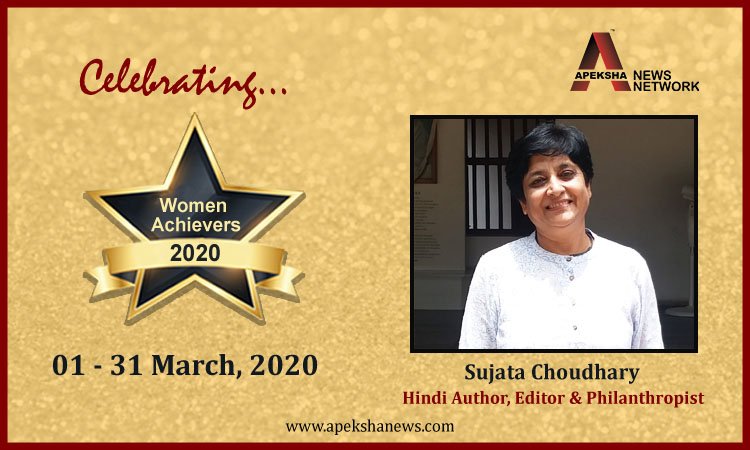“I think the government should regulate ads regarding these ‘sex biased abortions’ and spread the message on why it should be stopped and talk about the importance of girls to their parents,” suggests Author and Philanthropist Sujata Choudhary

Gandhian Sujata Choudhary is not just known for following the principles of our beloved ‘Father of the Nation’, Mahatma Gandhi, but is also an accomplished author with more than 22 literary works in her credit. Most of the central characters of her books are women strugglers. Her literary works are based on religion, politics, society, history, and women's rights as well as Gandhian thoughts and principles. Moreover, scores of her stories have also been broadcast on All India Radio.
She is the founding member of Shree Rash Bihari Mission, a trust that provides various skill development training for self-employment of the underprivileged women, runs several CBSE schools for a minimal fee with a partial or full scholarship for rural children, grants capital to widows and abandoned wives, and manages charitable home shelter in Vrindavan. She has donated 13 Bighas land to establish a Gandhi Ashram and an educational institute that aims to provide education and employment in a remote backward village of Banka District in Bihar.
Apeksha News network had an exclusive conversation with the renowned author-editor and philanthropist Sujata Choudhary where she talks about issues related to women in India and shared some suggestions to the government. Check out the excerpts!
Tell us something about your journey so far as an author, editor, and philanthropist.
When my first story got featured in ‘Balak’ magazine, I was in the 9th standard. Since my childhood, I have always got disturbed by injustice prevailing in the society. When I would see discrimination towards women, the ache inside me would come out in the form of words. I am from Bhagalpur in Bihar. It is one of the remote areas of India significantly away from its centre. During my stay here, I had faced many obstacles to get my book published. It was a challenge to do so initially. But with time, I have been able to do that I wished for.
What barriers have you faced, as a woman, in becoming successful in your field? How did you overcome them?
I don’t think I have achieved it all yet. I am still a struggler. Whenever you take on an unconventional path, initially people don’t appreciate your efforts rather you have to face sarcastic remarks. I work for the empowerment of women. They have not been fully empowered yet, so I haven’t been successful yet. I also work for the regeneration of the Dalit community. If their situation or living standards get better, I would feel that I have contributed a bit to whatever I have been doing.
I also work on children’s education. Even today illiteracy is a big problem in our country which makes me really uncomfortable. I, therefore, cannot claim to be successful until illiteracy is totally wiped out from our country. But if ‘struggle epitomizes success’, then I may be considered successful in my endeavors. I like to write and work for society, but I don't like any sort of publicity for the same.
What is the biggest struggle of a woman today in rural India?
For women in rural areas, their principal struggle is their question of existence and identity! The women in these areas work twice as hard as the men - right from farming to animal husbandry and finally to taking care of their family and home. They have no significant rights even after providing endless services. In fact, they get no recognition for their labor!
Do you think the existing programs introduced by the government for women empowerment need enhancement? Any suggestions to the government?
At present, the initiatives proposed by the government for women empowerment are active only on the papers. Girls are ignored since birth and ‘female feticides’ are practiced until this day. In the same household, when compared to boys, the girls are more prone to malnutrition and girls comparatively always have to compromise with their studies. I think the government should act on these ‘sex-biased abortions’ and spread the message on why it should be stopped and talk about the importance of girls to their parents.
I mean to say, families need to feel the importance of girl-child and only then the sex-ratio will improve in our society. Advertisements like “Bahu kahan se laaoge” cannot play a significant role in establishing the importance of girls, rather slogans should be like 'Betiyan hi darasal budhape ki lathi hain'. We should strive to instill the importance of girls more at their birthplace and give her a more due weightage as a 'beti' than as a 'bahu'. The government should develop programs for their safety, along with the provision of equal employment opportunities for them so that they can continue working without any fears, anxiety or uncertainties.
Movement for equality of women’s rights has been a long battle. How far has this equality game reached or is successful? Can you suggest ways in which this can be achieved?
Achieving equality for women is still a long battle. Even though our constitution has given equal rights to men and women but in reality, from ‘families’ to ‘in-laws’ to ‘society’: nobody treats them equally. This battle for equality is just one dimensional; many other issues have to be addressed. The Indian law has granted rights for equal distribution of wealth among the sons and daughters. But it is not executed in practice, rather the daughters are criticized and ridiculed by the society when they try to exercise this right or ask for their share.
Additionally, the government should formulate a rule to provide appropriate papers to both sons and daughters in instances of will and property sharing. We collectively should strive to not only make the society aware of these rules but also make them mentally open-minded to accept it without any contention of any form.
Being a Gandhian, what are some of the basic principles that we can introduce to society to deal with the current issues happening in India?
Gandhi ji sent out several messages to the whole world emphasizing that ‘daughters’ are the concrete support system of the family and society. Gandhi used to believe that men and women, except for their minor physical differences, are not different in any other way. Women should voice their opinions to their family or society irrespective of any fear of criticism. Economic independence is most important for women, coz without it the real essence of freedom and equality is meaningless. Men should respect the freedom of women.
Moreover, Gandhiji's ideology of small cottage industries can make a huge difference in the numbers and proportions of self-sufficient women.
Tell us something about your initiative, Shree Rash Bihari Mission. What are the activities undertaken here?
Commencement of Shri Rasbihari Mission is very touching. This incident is from Vrindavan. I was walking on the road with my father when a woman appeared in the pit across the road. When we ran to her, a naked old lady was sitting there. There were tears in her eyes. She pointed out to a saree saying she has only one saree, she has cleaned it, will wear it on drying. Upon hearing this, I got chills in my bones. It was then that I thought about this mission. I began to feel that all my expensive sarees and jewelry were meaningless.
In 2000, a home was built for twelve women to live in Vrindavan and permanent arrangements were made for the women to live, eat and drink, from clothing to medicine, which is still running. Arrangements for medicines, food, clothes etc. are made for the destitute elderly women in the third week of November every year in Vrindavan. Apart from this, on a fortnightly basis, fifteen destitute women are provided ration so that they do not skip their daily meals. Arrangements have also been made for their trips to pilgrimage centers with a pure intent to give them happiness.
Sri Rasbihari Mission is running a charitable school by the name of LRN Vidya Sansthan in Makandpur village of Bhagalpur district of Bihar, in which about seven hundred children study. The mission is to help hundreds of girls in attaining their education. We have adopted about thirty children from the Dalit community to educate them. They have been provided notebooks, books, and uniforms for their schooling. Shri Rasbihari Mission is constantly engaged with the determination to teach socially and economically backward children.
We got the scavengers village (Domasi village) in Bhavnathpur panchayat of Bhagalpur district renamed to 'Krishna Tola' and now we are working towards cleanliness campaign by constructing toilets and bathrooms etc for the villagers. To make them self-reliant, driving drills and other trainings are being given to them. The Rash Bihari Mission is teaching these children to mutually interact with each other with an intent to make them more familiar with the mainstream. Children are doing very well in their studies and other programs.
Shri Rasbihari Mission has adopted Uchaka Tola, a small village in Bhagalpur district with the agenda of improving the structure of health, education, sanitation, plantation etc.
Shri Rasbihari Mission is totally devoted to educate children of Dalits and other backward communities in the village of Samastipur district of Bihar. Also, after renaming ‘Mushari Toli’ of Ilmasnagar as 'Sri Krishna Tola, a tiffin-system is run daily with the provision of two-times meal for 15 handicapped and aged destitutes. Shri Rasbihari Mission has also been working continuously for the flood victims of Bihar. They always reach out to people in need with food, clothes, candles, matches, and books for children and thousands of people. We have donated 13 bighas of land for Mahatma Gandhi Ashram in Subhanpura village of Banka district in Bihar. On this land, the Gandhi Ashram is running successfully. There is also a proposal to establish a Mahatma Gandhi Vidya Sansthan on that land along with the asharam.
Shri Rasbihari Mission also organizes Shri Rasbihari Sahitya Sammelan Samaroh every year in the field of hindi literature (prose, poetry, criticism) by honoring 3 writers from this genre. The Mission is also proceeding to publish its magazine named ‘Sabarmati’.
Literature plays a huge role towards the growth of the country, considering culture, youth, etc. What do you feel that what kind of literature does India needs currently?
Literature must be based on truth, and there must be some message in it. Any work of literature should promote scientific thinking and most importantly keeps a close watch on ending superstition, hypocrisy. A piece of literature should be designed to encourage the backward, poor, weaker minority to pursue it. While saving pride in the diverse heritage of India, literature should not be used in a dogmatic attempt to glorify the evil practice.
What main change would you like to see for young girls in the next generation?
Even today, women live in pressure and that is the pressure of ‘being a woman’. This pressure ranges from how she gets up, how she speaks, to how she goes on living. They have to become ‘bonsai’, instead of the huge banyan tree.
I feel women must have freedom from these things, so that they can live freely, with her entirety.
What kind of woman inspires you and why?
A woman who thinks about society and doesn't give more importance to her happiness or sorrow inspires me. As mentioned by Gandhiji, women who do not run after rank, money, prestige rather thinks about the person standing on the last footboard inspire me.
International Women’s Day celebrates the scientific, political, economic and social achievements of women. In your experience as a successful woman, what is its significance?
When a woman is honored, society starts giving due recognition to her work. Slowly and gradually the attitude of society changes towards her, and she starts getting respect in the society which is generally not a privilege to a woman. This encourages young girls and others to move forward. Hence, celebrating this day is important until inequality completely perishes from our society!
What is your message to the young generation in one sentence?
Be bold, be fearless and stay as you are!
Apeksha News Network congratulates Sujata Choudhary for her contribution and commitment towards the society with her work and words, and wishes her good luck for her future endeavors!















































